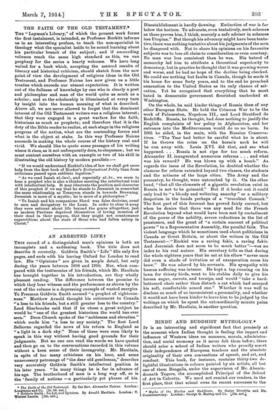AN ARRESTED LIFE.t
Twis record of a distinguished man's opinions is both an incomplete and a saddening book. The title does not describe it correctly. Goldwin Smith's "Life" fills only five pages, and ends with his leaving Oxford for London to read law. His " Opinions " are given in ample detail, but only during the years between 1898 and 1910. Nor, when com- pared with the testimonies of his friends, which Mr. Haultain has brought together in his introduction, are they wholly pleasant reading. The difference between the promise to which they bear witness and the performance as shown by the rest of the volume is a depressing example of wasted energies To Freeman Goldwin Smith seemed "a prophet of righteous- ness." Matthew Arnold thought his retirement to Canada "a loss to his friends, but a still greater loss to the country." Lord Sherbrooke said that if he chose a great subject he would be "one of the greatest historians the world has ever seen." Dean Church spoke of the "nobleness and elevation" which made him "a loss to any society." The first Lord Selborne regarded the news of his return to England as "a light in a dark sky." None of these were men likely to speak in this way without having good grounds for their judgments. But no one can read the words we have quoted and then go on to the conversations recorded in this volume without a keen sense of their incongruity. Mr. Haultain, in spite of too many criticisms on his hero, and some unnecessary patronage of "the dear old gentleman," describes very accurately Goldwin Smith's intellectual position in his later years. "In many things he is, far in advance of his age. The brotherhood of man is a long way off, so is the ' family of nations —a particularly pet phrase of hie.
• The Faith of the Old Testament. By the Bar. Alexander Nalrne. London Lonymana and Co. [2s. 6d. nat.) t Gelds:in Smith: his Life and Opinions. By Arnold Hanitain. London: T. Werner Laurie. [Mt net.) Disestablishment is hardly dawning. Extinction of war is far below the horizon. To advocate, even tentatively, such scheme. as these proves him, I think, scarcely a safe adviser in schemes less Utopian." But though his advocacy might have been tenta- tive, there was nothing tentative about his judgments of the men he disagreed with. Not to share his opinions on his favourite subjects was to lose all claim to consideration or even courtesy. No man was lees consistent than he was. His hatred of monarchy led him to attribute a theoretical superiority to democracy, but in practice he thought that it was growing worse and worse, and he had no hope of the decline being checked. He could see nothing but faults in Canada, though he made it his home for some forty years, and to the end he preached annexation to the United States as its only chance of sal- vation. Yet he recognized that everything that he most hated in democratic government flourished unchecked at Washington.
On the whole, he said kinder things of Russia than of any other European State. He held the Crimean War to be the work of Palmerston, Napoleon III., and Lord Stratford de Radcliffe. Russia, he thought, had done nothing to justify the English complaints of her policy in Afghanistan, and her entrance into the Mediterranean would do us no harm. In 1905 he sided, in the main, with the Russian Conserva- tives. "The Tsar bad better be careful what he is about. If he throws the reins on the horse's neck he will be run away with. Louis XVI. did that, and see what happened. . . Russia is not ripe for too much reform. Alexander II. inaugurated numerous reforms . . . and what was his reward P He was blown up with a bomb." As regards the issue of the Revolution, he doubted whether the clamour for reform extended beyond two classes, the students and the artisans of the large cities. The Army and the peasantry, he thought, were untouched by it. On the other hand, " that all the elements of a gigantic revolution exist in Russia is not to be gainsaid." But if it broke out it could only lead to " a bloody and weltering anarchy " or a military despotism in the hands perhaps of a "truculent Cossack." The first part of this forecast has proved fairly correct, but when he denies that there was any need for the French Revolution beyond what would have been met by curtailment of the power of the nobility, severe reductions in the list of pensioners, and the grant of "a certain amount of political power " to a Representative Assembly, the parallel fails. The violent language which he sometimes used about politicians in Canada or Great Britain, or about the writers in the Old Testament— " Ezekiel was a raving fakir, a raving fakir. And Jeremiah does not seem to be much better "—was no index to his real nature. His secretary tells us that during the whole eighteen years that he sat at his elbow "never once did even a shade of irritation or of exasperation cross his brow." He was adored by his servants. His sympathy with human suffering was intense. He kept a tap running on his lawn for thirsty birds, went to his stables daily to give his horses sugar, carrots, and turnips, and would " take a hard- bottomed chair rather than disturb a cat which had usurped his soft, comfortable armed one." Whether it was well to disclose so much of no inconsistent a personality, and whether it would not have been kinder to leave him to be judged by the writings on which he spent the extraordinarily minute pains described by Mr. Haultain, is another question.














































 Previous page
Previous page